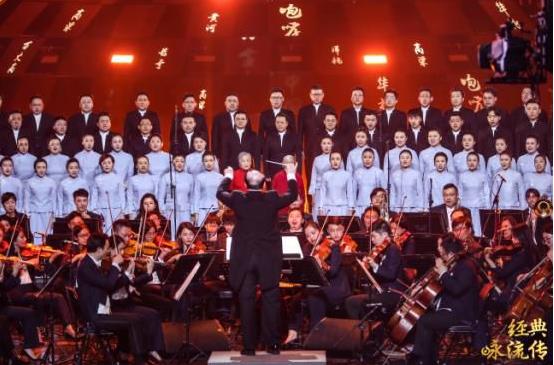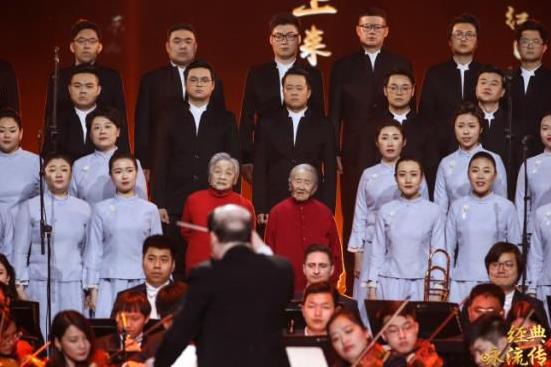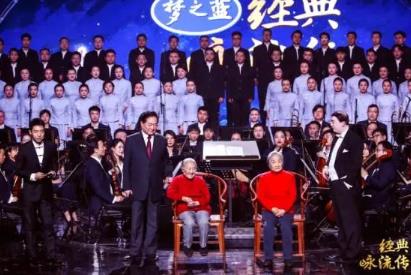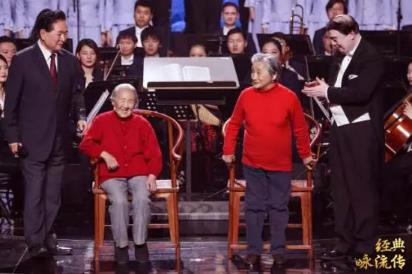"Classic Chanting" sings not only The Yellow River Cantata but also Chinese’s national soul.
guide reading
On April 13th, 1939, The Yellow River Cantata premiered in Yan ‘an. This symphonic epic, composed by the poet Guangweiran and the musician Xian Xinghai, has spread the roar of the Chinese nation throughout China and even the whole world.
On April 13th, 80 years later, on the stage of the second season of the large-scale poetry and cultural music program "Classic Chanting" broadcast by CCTV-1, the singers of different times sang this "national strongest voice" during the Anti-Japanese War again.
"A country and a nation cannot live without a soul." General Secretary of the Supreme Leader said this when attending the joint meeting of members of the cultural, artistic and social sciences circles at the second session of the 13th Chinese People’s Political Consultative Conference. The Yellow River Cantata, with the Chinese nation’s mother river as the creative background, integrates folk songs and folk music representing excellent traditional culture. As the horn of national spirit, it is always inspiring and enduring from generation to generation, just as the soul of a nation exists in the hearts of generations.
The Media Tea Party holds that, after a lapse of 80 years, the stage of "Classic Ode" reproduces this magnificent national epic, and leads the public back to the years when passion is burning with a spiritual dialogue that spans time and space, reminding the public not to forget the spirit of fighting dangerous beaches and waves and the unyielding integrity. By inspiring the cultural identity of Chinese sons and daughters, it encourages the public to gather strength and step on the sonorous drums to move towards a better future.
Emotions that make you cry,
Called "pure heart" and "national soul"
"A chorus can top 100,000 muskets" — — This comment refers to The Yellow River Cantata. In do or die, where the nation was in peril, Xian Xinghai wrote music in a vertical stroke and roared for the war of resistance.

On the stage of "The Classic Ode", four The Yellow River Cantata singers of different times performed this magnificent epic together. They are: Li Yifei, a 98-year-old Yan ‘an Luyi student, who was a member of the choir when her work was first performed; Jie Bing, a 97-year-old veteran of the second anti-enemy drama team, The Yellow River Cantata developed from this drama team; Mr. Qu Xianhe, 75, is one of the restorers and reciters of the third paragraph of how the Yellow River’s waters move out of heaven after the founding of New China. There is also Mr. Yu Feng, the 55-year-old dean of the Central Conservatory of Music and a well-known conductor, who re-sang the "Yellow River" spirit of Yan ‘an Luyi in the new era.
In the program, the singer’s voice is sonorous and heroic in his old age. As Mr. Liao Changyong, a member of the appreciation group of "Classic Ode", said: "How many people embarked on the revolutionary journey by listening to this song, and how many people went to the front line by listening to it and gave their lives to the country and the nation. This work has accompanied us in China for 80 years, which is not only a musical position, but also a spiritual position, which is supreme."

This year marks the 70th anniversary of the founding of New China. After 70 years of hard work, great changes have taken place in China. No matter in the history of the Chinese nation or in the history of the world, this is an epic of earth-shaking struggle. Looking back at the history of our country and reliving the unforgettable national memory, culture is undoubtedly the most resonant, penetrating and infectious carrier.
Media Tea Party believes that as a program that deeply cultivates Chinese excellent traditional culture, Classic Ode to the Spread pays special attention to seeking a breakthrough in conception this year, strengthening the modernity and fashion of classic poetry through new melody editing, song interpretation and mass communication, and deeply excavating the contemporary value and world significance of China’s excellent traditional culture. The new interpretation of The Yellow River Cantata in the program vividly reflects the struggle practice of the Party and the people in the form of music, and at the same time, it encourages all Chinese people to carry forward the past and struggle.

The reason why classics are not old,
Because it is rooted and continues the blood of culture.
"When we hear this song again, we will still be excited by the blazing patriotism in the song. Recalling the past, the road ahead is far away, and our generation shoulders heavy responsibilities and lives up to good times! " After this issue of "Classic Chanting" was broadcast, an audience left a message like this.
From war to peace, from weakness to prosperity, from humiliation to revival — — For today’s public, the memory of the times represented by The Yellow River Cantata seems to have been "yellowed" for a long time, but why does this revolutionary symphonic epic always haunt the public’s mind, and every time it is heard or sung, it will arouse such a strong spiritual resonance?
The Yellow River is the cradle of the Chinese nation. It has nurtured Chinese civilization and nurtured Chinese children. Throughout the ages, literati in all previous dynasties regarded the "Yellow River" as a symbol of heroic and unyielding national spirit. This irreplaceable totem significance has already penetrated into the bone marrow of Chinese children — — No matter where we are, it is not blood that flows in our veins, but the water of the Yellow River.
The Media Tea Party noticed that many viewers enjoyed the third movement of The Yellow River Cantata for the first time because of the classic chant, which was a recitation of a poem with music, beginning with Li Bai’s classic poem "how the Yellow River’s waters move out of heaven". At that time, Mr. Guangweiran complained bitterly about the national disaster with nostalgia and praised the heroes of the times, which made this work with the "Yellow River" as the spiritual carrier have unprecedented depth and vastness.
Classics can talk to the past or wave to the future. Therefore, every time the The Yellow River Cantata resounds, a mighty national memory will flow in our mind, and the roaring of the Yellow River, which has been baptized by war, has multiplied the inspiring power. This long-standing cultural identity is unforgettable and unswerving. The Yellow River Cantata is reappeared in Classic Poems, in order to make the water of the Yellow River surge in our hearts forever, and provide a strong spiritual incentive for moving forward.
"Eighty years ago, the Yellow River roared, sending out the voice of national salvation; Eighty years later, the Yellow River roared and sounded the horn of the great rejuvenation of the nation. "This is the simple voice shared by the 98-year-old Li Yifei.
Zhang Andong, the son of Mr. Guangweiran, also said with emotion in Classic Ode: "A foreigner says that a nation that can create The Yellow River Cantata is an unyielding nation. What I want to say is that a nation that can continue to perform this work for 80 years is a great nation; A nation that can continue to inherit the spirit of The Yellow River Cantata should be a nation that creates brilliance. "

Bacon casts souls,
Literary and art workers should be portraits, biographies and virtues of the times.
In 1939, when Xian Xinghai was visiting a young poet lying in his hospital bed, he heard the recitation "Ode to the Yellow River" about the roaring and rushing of the Yellow River, and immediately his thoughts surged and he completed the The Yellow River Cantata.
The reason why this work is awesome lies not only in the content itself, but also in the hardships and sincerity of behind-the-scenes creation. In the past, artists of the older generation in Yan ‘an used petrol cans as bass, tea pots as percussion music and bullet casings as sound flutes & HELIP; … In the extremely simple environment, they played a voice for the public with their heart, affection and hard work, and deeply engraved their works in the memory of the times of all Chinese people.
At the first performance, the auditorium was very small, and a program had to be performed 17 times before the audience could watch it in turn. Many times, they climb mountains and perform for soldiers, militiamen and women on earthen platforms.
"Classic Chanting" shows the musical instruments found in Harbin Conservatory of Music and used in that year’s performance. When the copied "oil drum bass" was played on the stage, the timbre was so clumsy, but everyone fell silent. The program sensibly makes everyone realize that the artists of that year were performing the sacredness in their hearts and expressing their love in flames under what difficult conditions. Li Yifei proudly said: "This is the creation of our musicians!"
The Yellow River Cantata’s "roaring" again is an inspiration in revisiting and a torture in contemplation. Any nation can not achieve national prosperity and stand among the nations in the world without the active guidance and strong support of its own excellent culture — — Do today’s cultural and literary workers really shoulder the important responsibility of enlightening thoughts, cultivating sentiment and moistening the soul, and truly undertake the mission of the times of educating people with culture, educating people with literature and cultivating people with literature?
Mr. Xian Xinghai once said: "Our folk songs are not folk tunes, but people’s songs." Today, this still guides our artistic creation: only when the works are closely combined with a country, a nation and an era can we truly have the vitality that reaches people’s hearts and surges.
According to Media Tea Party, programs like Classic Chanting not only show the influence of traditional culture on Chinese people in the contemporary era, but also strengthen Chinese’s recognition of the culture we have inherited for many years. The new era calls for outstanding writers, artists and theorists. Literary and artistic creation has a vast space, and it insists on keeping pace with the times, taking the people as the center, dedicating people with fine products, and leading the fashion with mingde — — We expect more "The Sound of Endeavour" to be sung constantly, and become the next classic that will be circulated forever in the sigh of the times.